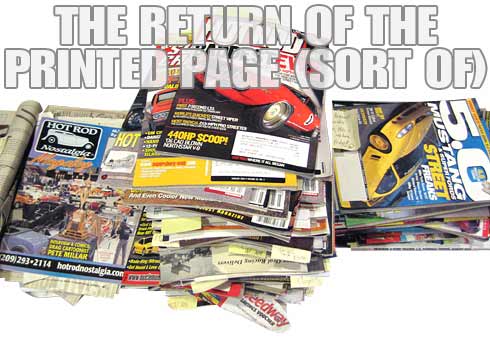| 

6/8/05
 admit it: I'm a paper guy. I remember the anticipation
and excitement of pedaling my bicycle up to Norm's Newsstand
in the Los Angeles suburb of Sepulveda. The quarter in my
pocket was often the last remnant of the previous week's
allowance. Wednesday was the day that Drag News came to the
San Fernando Valley, less than 72 hours after the weekend's
last parachute had popped. I loved the way that crisp newspaper
opened for the first time; the smell of fresh ink escaping.
I never ceased to be amazed by whatever magical process got
those days-old action photos and race reports into print
so quickly -- not even after becoming the editor of Drag
News as a grownup, in 1975.
admit it: I'm a paper guy. I remember the anticipation
and excitement of pedaling my bicycle up to Norm's Newsstand
in the Los Angeles suburb of Sepulveda. The quarter in my
pocket was often the last remnant of the previous week's
allowance. Wednesday was the day that Drag News came to the
San Fernando Valley, less than 72 hours after the weekend's
last parachute had popped. I loved the way that crisp newspaper
opened for the first time; the smell of fresh ink escaping.
I never ceased to be amazed by whatever magical process got
those days-old action photos and race reports into print
so quickly -- not even after becoming the editor of Drag
News as a grownup, in 1975.
Thus began a lifelong love affair with what the kids call "print." As
I type these words on my 1984-model Macintosh (the closest
thing to a computerized typewriter), I am surrounded, quite
literally, with print publications, old and new. Even directly
over my head, spanning the trusses on plywood sheets, are
acid-free cardboard cartons containing my most-prized possessions
-- including replacement copies of those 1960s' Drag News
that I'd read from cover to cover, then thrown in the trash.
Who knew how priceless these cracked, yellow pages would
be, four decades down the road?
ADVERTISEMENT
 |
|
Both
regular readers of this column will recall that, mere months
ago, this very space was listing the virtues of the two electronic
monthlies that now bring me most of my drag news. Yes, I've
learned to live without the feel and smell and ink-stained
hands associated with inked paper. I've trained myself to
strain to read unclear computer fonts and see fuzzy screen
images, composed of not-quite-connected dots. Since the advent
of wireless laptops, I can confirm that it's possible to read
an e-zine in the stall of an airport restroom. The price is
right, too (not counting the cost of all the hardware and
software required to make this modern miracle happen).
Nevertheless, there are many things I miss about printed
matter that no amount of wiz-bang technology is likely to
replace. First and foremost, I can't shake the fear that this
issue you're reading will simply vanish into cyberspace, later
if not sooner. No amount of patronizing reassurance from electronic
publishers about "eternal archiving" can shake my
suspicion that sometime after my buddies Burk and Bennett
drop dead or sell out, these pages will exist only in the
memories of their readers. What will future columnists and
historians use as reliable research material? What will take
the place of my beloved, embossed binders of Hot Rod, Car
Craft, Popular Hot Rodding, Drag Racing USA, Super Stock,
and Petersen's Drag Racing?

|
